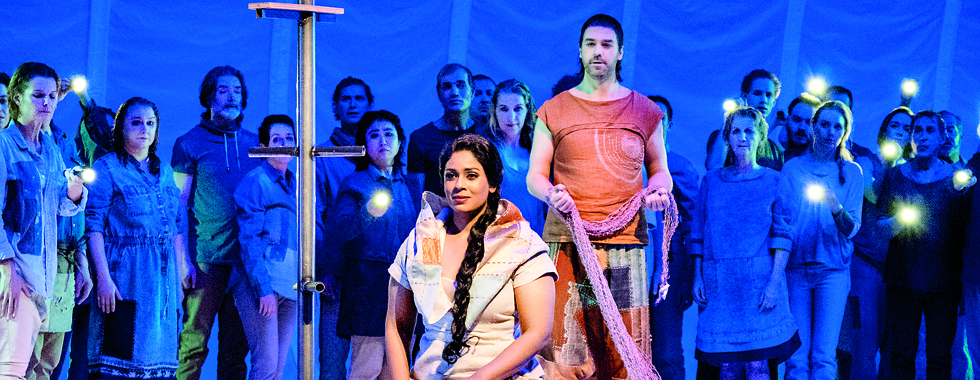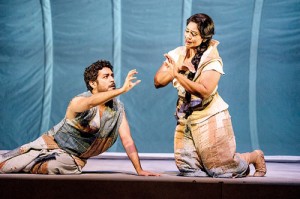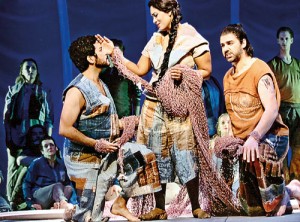Kishani’s operatic moment
She is constantly raising the bar; She is a seasoned trailblazer, regularly putting Sri Lanka on the operatic world map and now she has done it again: Earlier this year, Sri Lanka’s operatic diva Kishani Jayasinghe became the first Sri Lankan -in the history of World Opera -to professionally sing the role of Bizet’s Sri Lankan operatic heroine, Leila, on the international stage.

Kishani in scenes from ‘The Pearl Fishers’. Pix courtesy Marco Borggreve-Nederlandse Reisopera
Nicholas Mansfield, the Artistic Director of the Netherlands Reisoper, says unequivocally, that he decided to stage the opera, as soon as he first heard Kishani Jayasinghe in audition. “I felt she was absolutely perfect for the role – in every way – and it seemed imperative that I stage the Pearl Fishers for Kishani. So I did.” The production was staged from late January to late February by the Dutch Touring Opera.
So no surprise then that Kishani was also the Poster Girl for the production -literally and metaphorically. “I had such a wonderful time with the phenomenal photographer Marco Borggreve.” He came up with the image for the poster of the Pearl Fishers, which Kishani says literally had her stopping in her tracks and holding her breath. “It was a staggeringly beautiful and powerful image. I couldn’t believe he made me look like that!!!” says Kishani who said she made sure to take a few copies of the poster home with her – “for posterity!” she laughs.
The Pearl Fishers, or Les pêcheurs de perles as it is known in its original language of French, is an opera in three acts by the French composer Georges Bizet, set to a libretto by Eugène Cormonand Michel Carré. Bizet is perhaps best known for Carmen, often referred to as the most popular opera in the world. Before Carmen however, Bizet composed the Pearl Fishers, an opera peppered with jewels of such rare musical quality that the ear positively weeps with its sheer clarity and beauty.
 The plot, features a love triangle quadrangled by religious vows and cultural beliefs. Both chief pearl fisher Zurga and hunter Nadir are in love with Leïla, a noble priestess who swears to protect a village in ancient Ceylon with her chaste prayers. Like most well loved operas, it ends in a conflagration, but it is the village that burns, not the sacrilegious lovers. His love unrequited, Zurga commits arson to allow Leïla and his old friend Nadir to escape the vengeful mob of villagers. Bizet’s romantic music is utter musical genius and the melodies throughout, are entrancing. It is no wonder then, that despite its absence from regular repertoire from time to time, the Pearl Fishers is working its way back into traditional grand operatic regular fare.
The plot, features a love triangle quadrangled by religious vows and cultural beliefs. Both chief pearl fisher Zurga and hunter Nadir are in love with Leïla, a noble priestess who swears to protect a village in ancient Ceylon with her chaste prayers. Like most well loved operas, it ends in a conflagration, but it is the village that burns, not the sacrilegious lovers. His love unrequited, Zurga commits arson to allow Leïla and his old friend Nadir to escape the vengeful mob of villagers. Bizet’s romantic music is utter musical genius and the melodies throughout, are entrancing. It is no wonder then, that despite its absence from regular repertoire from time to time, the Pearl Fishers is working its way back into traditional grand operatic regular fare.
So any anecdotes from behind the scenes? “We had some very amusing moments during the production” says Kishani, and judging from her expression they also bring back fond memories.
“It was a modern production with a fairly timeless feel to it. Rather conceptual in many ways and one had to exercise a certain amount of imagination to connect the dots, so to speak, but in the end it was a really emotional and beautiful production.”
Rather demanding too for Leila, who sings practically non-stop throughout the opera with a wide range of emotional colours and voca acrobatics. One eye popping moment of the opera was during her Act 1 aria, ‘O Dieu Brahma’. A complicated coloratura aria which the Director thought would be best served with Leila singing it from ‘on high with the singing wafting off to the Gods in the Heavenly skies’. Kishani says she happily agreed, never imagining that he meant it quite literally. “I suddenly found myself staring up at an eight foot steel pole with a piece of wood at the very top that looked no bigger than a postage stamp. I thought it was a rather curious design, never imagining that that conversation would ultimately lead to my having to scale this same eight foot steel pole, seconds before my aria, and stand on the postage stamp and sing a complicated aria!”
No doubt it was quite an experience….”The first time I did it, I remember being grateful for two things: Firstly that I didn’t have a fear of heights, and secondly, that I had been almost part monkey growing up – having been such a tomboy climbing all those trees!”. One would be hard pressed  to glimpse a trace of a tomboy in the grown up version of today’s glamorous young Soprano.
to glimpse a trace of a tomboy in the grown up version of today’s glamorous young Soprano.
All in all, it turned out to be a good production move which created a powerful and touching moment with Kishani’s heavenly voice wafting up towards the skies like an Angel’s cry for mercy from the gods. The production and set design in its entirety was simpler than one might have expected, but extremely clever nevertheless. It wasn’t burdened with the heavy trappings that traditionally weighs down this opera, but instead the uncluttered stage gave the audience more room to breathe and enjoy the depth of character each artiste brought to the stage. It also ensured the audience never lost sight that the singer and the voice was the most important instrument in the production, which of course was a boon for Kishani. Her rich and powerful instrument navigated the complicated passages of Bizet with such flexibility, sensitivity and supreme confidence that it was impossible not to be drawn into the spellbinding atmosphere that Kishani seems to be able to create so effortlessly, every single time.
The positive and enthusiastic reception was evident in 17 performances with a full house each night, of over 1000 patrons every day. Every performance ending with a resounding standing ovation and multiple curtain calls with the Prima Donna, Kishani Jayasinghe, rightfully earning the coveted final bow. In Kishani’s own words, “it was like something out of a fairytale…”
Kishani says, “In addition to the buzz of a performance, one of the best things about this job is the family you form on the road. My colleagues were simply brilliant and that made every minute an absolute pleasure. We were like a United Nation of Singers. My colleagues were American, English, Russian, Turkish, Thai, Spanish and Dutch and it was an incredibly international and talented cast.” They were all meeting for the first time. They become as close as family during the course of the production – 3 months in this instance – and it is quite possible that they may not meet again. A curious and somewhat unfortunate aspect of the job. However there is a plus side to it too. As Kishani points out, “you end up with a musical family all around the world!”
The role of Leila seems to have been a perfect fit for Kishani. Opera Magazine commented that “Maestro Bizet must certainly have had Miss Jayasinghe in mind when he composed the role of Leila…”. The National Review stated that “Kishani Jayasinghe, the Sri Lankan Soprano is a perfect fit for the role of Leila, the Sri Lankan priestess. Her performance a perfect marriage between the radiant glamour of the East and the flawless technical prowess of the West”. Critic Jennifer Van Haarten enthused that “Kishani Jayasinghe’s Leila is a treasure to behold. Total perfection vocally and visually”. According to the Opera Blog, Kishani’s voice was seamless, stunning and “sparkled” from top to bottom. The challenging coloratura of Act 1, the beauty and sensitivity of Act II and the charged power of Act III met in perfect harmony, all of which made Kishani Jayasinghe, a truly perfect Leila.


